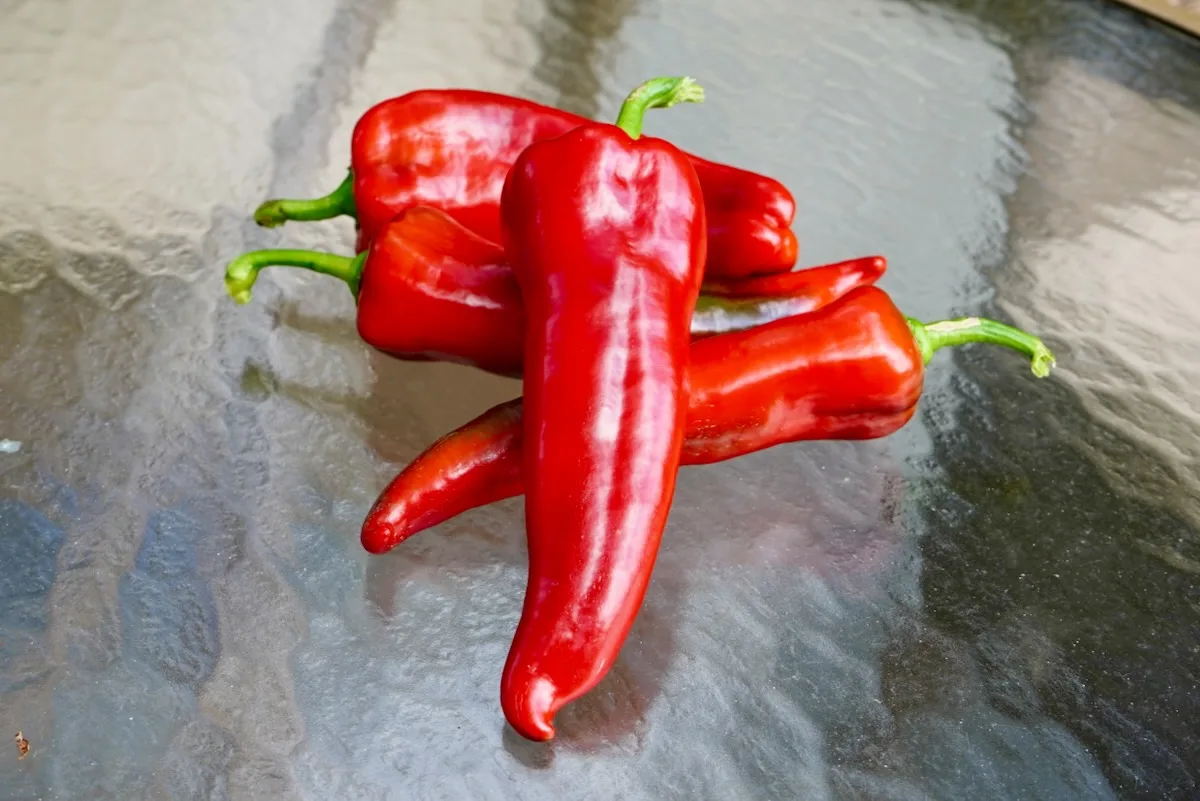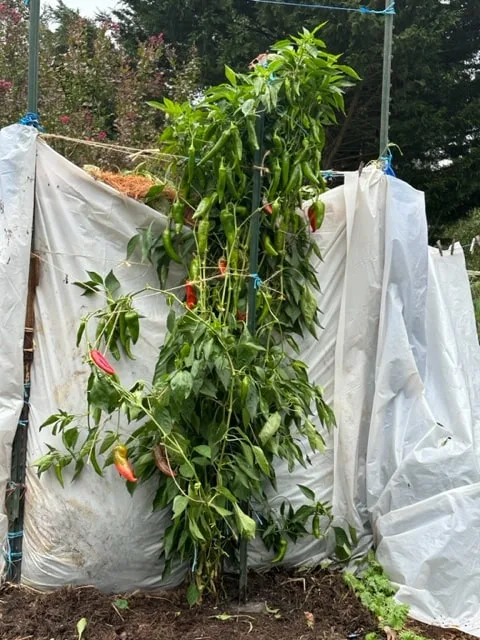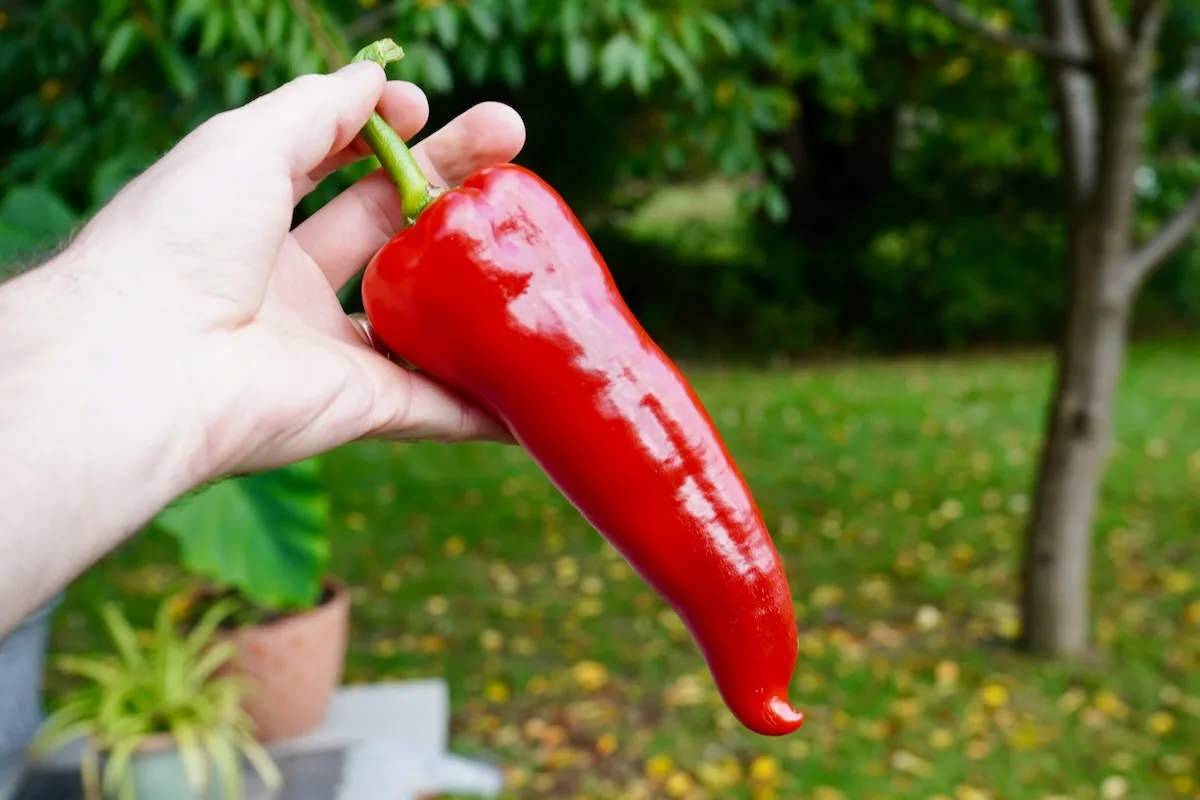Bell peppers can be tricky to grow. They are often susceptible to diseases and pests, and can deliver underwhelming yields as a result. But what if there was an alternative?
Carmen peppers are exactly that: a sweet pepper that is less fussy and more productive than many bell varieties. While these red peppers don’t have the stuffable shape of a bell, they deliver on yield and flavor.

Carmen Pepper Info
The Carmen pepper is a hybrid variety based on the classic corno di toro pepper. Also known as Italian bull’s horn peppers, these sweet peppers are perfect for roasting, salads, stuffing, and even making homemade sweet paprika powder.
| Name | Carmen, corno di toro |
| Type | Hybrid (F1) |
| Species | Capsicum annuum |
| Heat level (Scoville) | 0 SHUs (no heat) |
| Flavor | Sweet and fruity, similar to red bell pepper |
| Uses | Stuffing, roasting, frying, homemade paprika |
| Light | Full sun or afternoon shade |
| Watering | Evenly moist, good drainage |
| Seeds | Johnnys, Seeds n Such, Totally Tomato |
This variety was originally bred by Johnny’s Selected Seeds and was named after the gypsy Carmen in the French opera. It went on to win an AAS award in 2006 for it’s unique shape, sweetness, and earliness to ripen (about 75 days after transplanting).
Carmen Pepper Flavor and Uses
One of the highlights of the Carmen pepper is its sweet flavor. Not only are they sweet when red, but they are also plenty sweet before ripening, when green.

This is a great characteristic, as many bell peppers will be bitter and vegetal. With Carmens, you can harvest anytime after they reach their full size and expect great flavor. However, we prefer to allow them to ripen before picking for the best flavor.
Other than being sweet, the peppers have a fruity, red bell pepper like taste. The walls of the peppers are not quite as thick as a big bell pepper, but are still thicker than most peppers, great for stuffing.
Carmen pepper uses:
- Stuffing
- Roasting and peeling
- Fresh eating (salads, dips)
- Fresh salsa
- Frying
- Paprika powder
Carmen Pepper Growing
The Carmen pepper is just as easy to grow from seed as any other large sweet pepper. If you have grown bell peppers, then you can grow this variety using a similar approach. I recommend using a container of at least 5 gallons, but growing in the ground is ideal for maximum plant size and yield.
In ideal growing conditions, these plants can grow to be very tall. Just look at this Carmen pepper plant grown by a Pepper Geek reader at well over 6 feet tall!

As you would expect, these plants do require adequate support to prevent broken branches and bent plants. As the fruits swell and become heavy, the branches tend to droop.
I recommend using a sturdy, tall stake, or a large metal cage made from strong steel for support. If the soil is full of nutrients, the plants will thrive.
Also, these plants grow well when clustered together in groups of 2 or 3 plants (planted within a few inches of each other. The extra foliage helps shade the fruits from direct sun exposure, reducing sun scald.

The Carmen pepper is a great choice for newer gardeners who want a reliable, high-yielding sweet pepper. There are also great bell pepper varieties, but we have found the Carmen to be particularly successful in our gardens.


Randall
Wednesday 3rd of January 2024
How can I order Carmen peppers?
peppergeek
Monday 8th of January 2024
We buy seeds from Johnny's here or some local nurseries may carry started plants in the spring.
Dave Wagner
Saturday 25th of November 2023
I haven't had much luck with bell peppers as far as produce. I have to grow peppers in containers and I know the yield will be less. Can you give a good soil to use for containers. Thanks, Dave